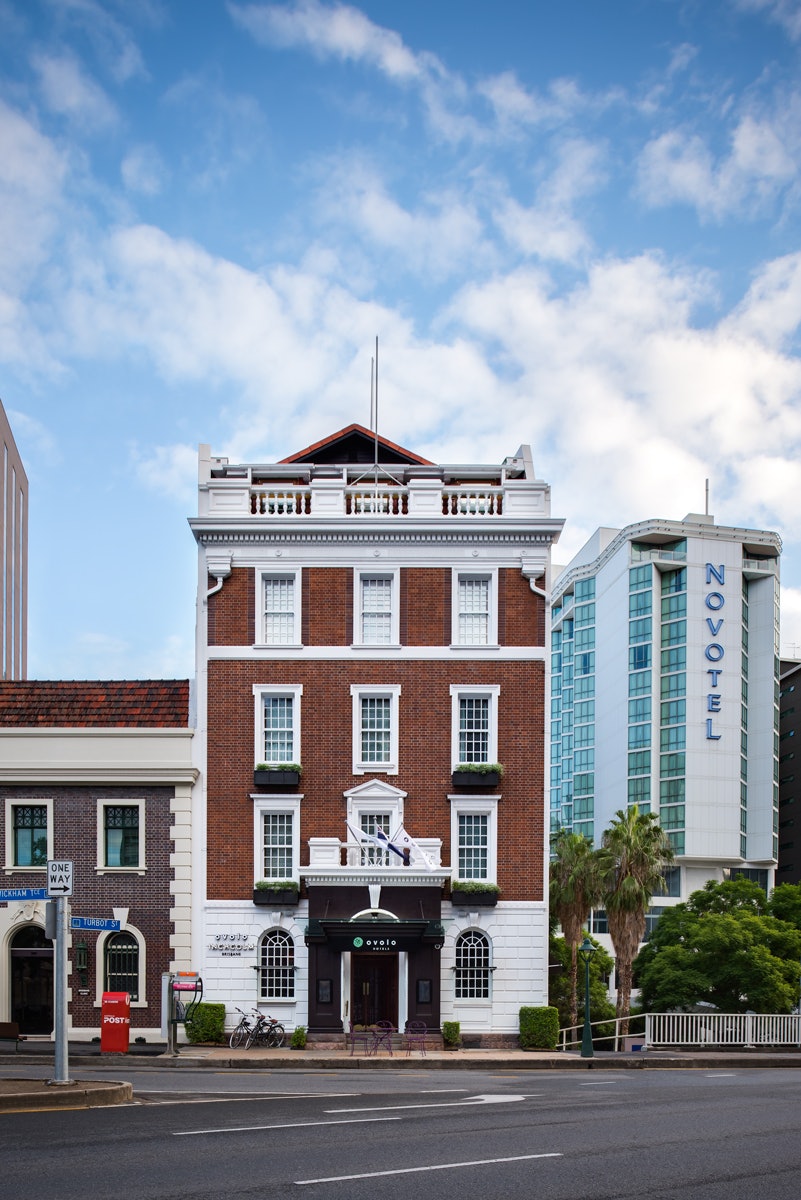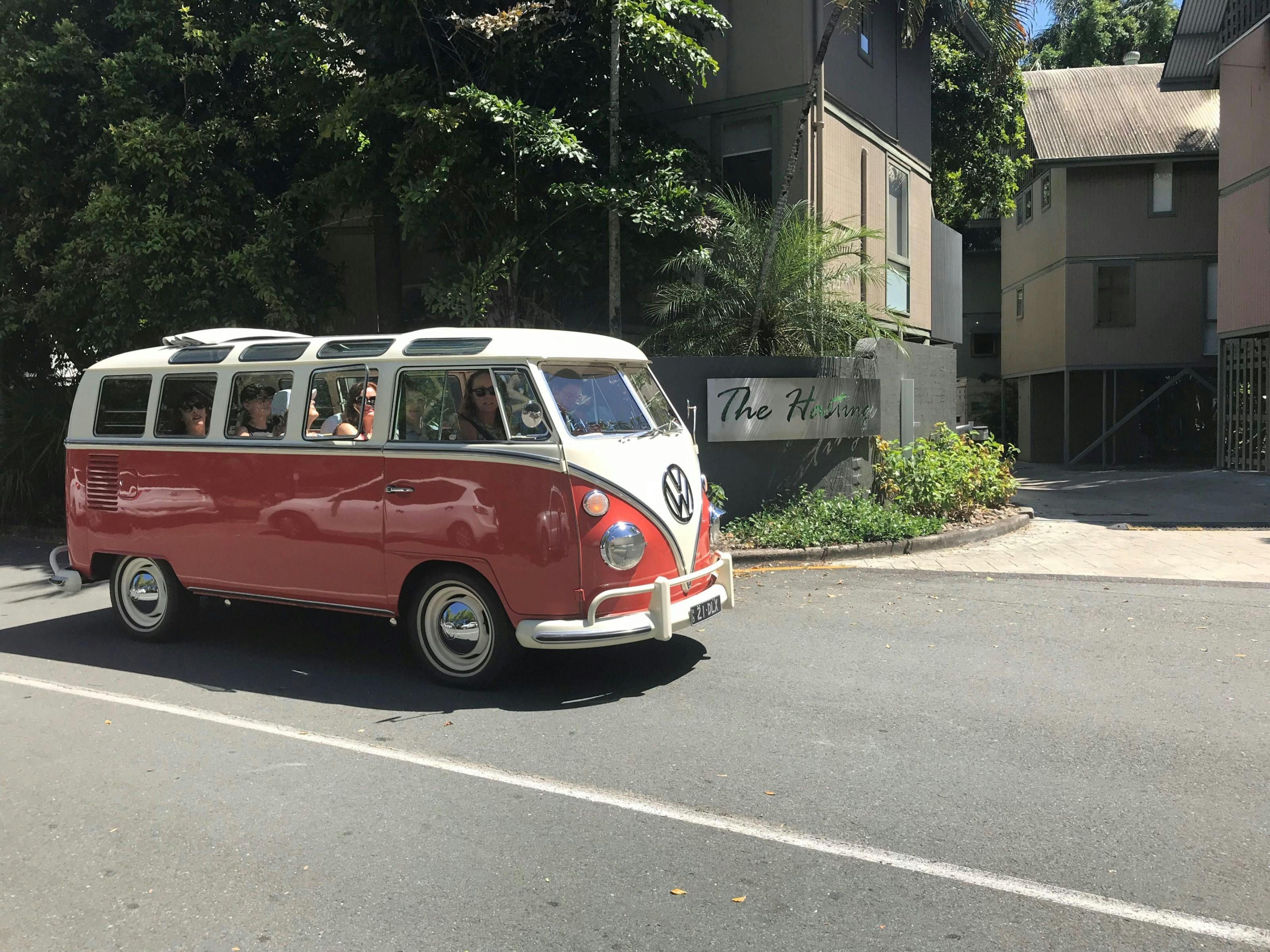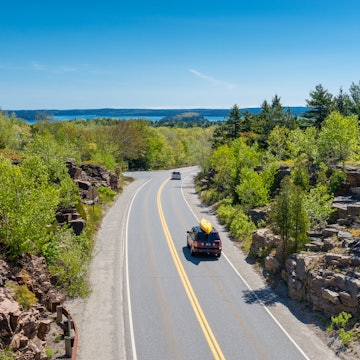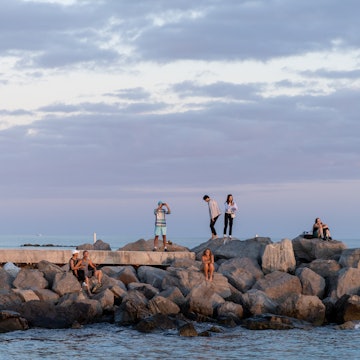

Glasshouse Mountain, view from Mount Ngungun © ghauriclicks /Getty Images
Blessed with year-round good weather, an unrivalled coastline and bountiful outdoor activities Queensland's Sunshine Coast merits are not lost on the locals and plenty are willing to share their favourites with you. Follow their lead and begin with booming Brisbane’s big city action (without the usual big city hassles), then explore neighbouring islands, foodie enclaves, spectacular beaches all just a couple of hours away.

Brights lights, Bris city
‘Big country town’ is a nickname some Queenslanders see as an insult to their fair capital. They shouldn’t, Brisbane has international appeal thanks to its exciting new restaurants, a sparkling modern skyline, and thriving arts scene – yet the city retains the friendliness, the Australianess, of a big country town.
The first inhabitants here, the Yuggara and Turrbal people lived south and north of the Maiwar (aka Brisbane) River respectively. To hear their story and imagine their world take a tour with Black Card Cultural Tours through the South Bank neighbourhood’s Cultural Precinct. You’ll also see indigenous art, including some amazing pieces that graced the walls of a G20 meeting in 2014.
For more local insights, such as where to get the best street food or the best shot of Story Bridge at night, arrange a wander with the Brisbane Greeters, a group of residents who are keen to show their city off to visitors.
Each city neighbourhood rewards time spent there: South Bank has the best city views and lush riverside gardens with numerous attractions; the CBD (that’s the central business district) is home to grand colonial-era buildings, top shops and the beautiful City Botanic Gardens; and Fortitude Valley (everyone just calls it ‘The Valley’) is the nightlife focus for the Brisbanites who like to play after dark.

The favourite Valley destination is tree- and designer store-lined James Street where Hellenika restaurant serves up delicious Greek food by the cool Calile hotel’s pool.
To mingle with more locals, head to the excellent Eat Street, a series of shipping containers turned into a street food market that hosts live music every weekend – catch the CityCat ferry to get here. Or if you’re hungry and closer to the city centre, redeveloped Howard Smith Wharves, tucked under Story Bridge, has the huge Felons Brewing Co (named after the very first European arrivals in the area) where the food and beer is as good as the river views.
Hanging out in the Hinterland
Departing Brizzy (as Brisbane is affectionately known), you won’t regret temporarily ignoring the siren call of the coast for a detour to the Hinterland, north of the city. The landscapes and hiking trails of the Glass House Mountains, a series of volcanic plugs that dot the area, are part of the appeal, as are the quaint small towns that make the Hinterland a food- and drink-lover’s destination. Especially popular are the local cheese makers and the 16 breweries that make this area a destination for craft beer aficionados. To allow you to drink and travel responsibly, Noosa Brewery Trail Tours offers several trips a week.

Accessing the Hinterland is easy as a day trip from Brisbane, or base yourself in one of its towns: Maleny has a local feel; the excellent, and surprisingly chilly come winter, Brouhaha is known for its beer and Sunday roasts; tiny Montville has a pretty high street with plenty of visitor-oriented shops and places to eat with mountain views; Eumundi, further to the north, is the hippy in the family, especially on market days (Wednesday and Sunday) when local arts and crafts, handmade clothes and, of course, palm reading are available.
For a break, Eumundi Brewery, in the century-old Imperial Hotel, brews up great small batch beers and offers tours on market days.
Getting to know Noosa
Glamorous Noosa is the Sunshine Coast’s headline act. Upmarket, but still with that laid back Australian vibe, you could easily spend several days and little energy here, lying on the sheltered, north-facing beach, shopping and eating your way along Hastings Street, and watching sunsets over the lagoon.
For something a little livelier, stroll the paths through Noosa National Park (keep an eye out for koalas, high in the trees) or up the energy expenditure with a kayak along the Noosa River through one of only two Everglades ecosystems in the world (the other is in Florida), part of Great Sandy National Park.

Elsewhere in this park, you can jump into a 4WD and speed along Teewah (aka 40 Mile) Beach. Epic Ocean Adventures will get you there and back without the worry of renting your own vehicle (and potentially being one of the 50 that get stranded on the beach every year). From May to October you can spot humpback whales (and occasionally southern right and minke) and, year round, dolphins. Look inland to the sand dunes lining the beach’s western side for 40km.
For some four-legged fun on what’s regularly named one of the world’s most beautiful beaches, head a little further north and take a horse ride along Rainbow Beach, so called because of the multi-coloured sand.

After your action-packed day you’re toughest decision will be choosing from the dining options back in Noosa. View restaurant in Peppers Resort has TV chef Matt Golinski serving up high quality, inventive food, just up the hill from Hastings Street. Or why just have someone else cook for you when at Wasabi, one of Noosa’s top restaurants, you can test your own culinary skills in one of the regular cooking classes; spend a couple of tutored hours making dishes, then tuck into them in the waterfront dining room.
Coastal capers
Queenslanders love their lengthy coastline and the southeast of the state has plenty of enticingly named spots that also deliver on the promise. Whether you want to get out on a bumpy 4WD tour followed by a hike through rainforest, or simply relax on a beach with a refreshing drink and excellent food options just a short stroll away, Brisbane’s coastal region can help .
The biggest sand island in the world, Fraser, looms large on the horizon just off the southeast Queensland coast. But don’t expect just a vast expanse of sand though, as there are lush forests and pristine freshwater lakes dotted all over this island, as well as secluded beaches for a sunbathe and a sea bath, the east coast’s famous 75 Mile Beach, and a dingo or two too. Getting here involves a barge or a plane, and, once here, getting around means having your own 4WD (or having one of the many local tour companies do the hard work for you). To spend the night (and you really should), there are sleeping options in the island’s main hub of Eurong, but better still is camping at one of Fraser’s 40-plus camping grounds. For more tips on getting the most out of Fraser Island, read this article.
Moreton Island might be just the third biggest sand island in the world (after Fraser and nearby North Stradbroke), but it gives you a similar experience to its larger siblings in a more compact area, and within easy reach of Brisbane (there’s a regular boat service and even a helicopter from the city).

A former whaling station turned popular resort, Tangalooma is the main visitor centre, welcoming hundreds of Brisbanites each weekend. It has accommodation and a multitude of activities that draw visitors back: quad biking, snorkelling around shipwrecks, tobogganing down sand dunes, and seasonal whale watching from May to October.
However locals and visitors here seem most excited about the sunset dolphin feeding on Moreton Island. Strict rules are observed and the amount of fish fed to the dolpins is only a small percentage of their daily intake, but given the responsible tourism concerns we'd advise you skip it. Instead, why not take a 4WD round the island, stopping at photogenic spots like Honeymoon Bay and looking out for the 195 bird species and the less welcome wild pigs (brought here as a food source and now proving difficult to remove). Turtles also frequent the waters and are fairly easy to spot on a tour of the island. Shyer and thus less easy to see are dugongs.
Tiny Lady EIliot Island is a 3500-year-old coral cay and the southernmost end of the Great Barrier Reef. As if that wasn’t enough to pique your travel-lust, it’s also an eco-resort that’s a haven for birds, marine life – and tourists who just want to switch off from everything (there’s no phone signal).
It’s also the only island along the reef’s two thousand kilometres where fixed-wing aircraft can land, with flights from the Gold Coast, Brisbane, Hervey Bay, and Bundaberg, making it easily accessible for southeast Queenslanders who want to visit the reef without travelling too far.
Getting out to view the living spectacle that is the Great Barrier Reef is a must. Glass bottomed boats are the sedate choice, while snorkelling gets you up close with minimal effort, thanks to a lagoon that can be accessed from a beach. Once in the water, look out for turtles, reef sharks, myriad fish species and, of course, coral. Back on land, birds, both migratory and permanent, easily outnumber the human population and are the cause of the strong smell you notice as soon as you get here (this guano was once a lucrative commodity). Look out for the ground-nesting bridled tern (really look out as they lay their eggs anywhere and everywhere) and tree-nesting white-capped noddies, beautiful birds, so called because of their bobbing heads.
Day trips are an option but a real treat is spending the night, especially if you can reserve one of the resort's glamping tents. Take a stargazing tour and relax by the ocean, dreaming about moving to southeast Queensland and becoming one of the blessed locals who call this region home.
Clifton travelled to Queensland with support from Tourism Queensland. Lonely Planet contributors do not accept freebies in exchange for positive coverage.























